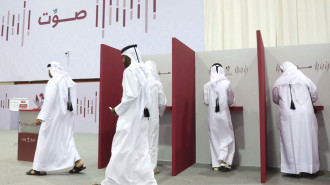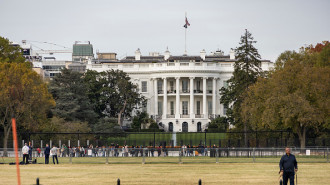Palestinian children in Gaza protest against WFP, accusing it of trying to starve them
Dozens of local children in the Palestinian coastal enclave on Tuesday gathered to demonstrate against the UN World Food Programme (WFP), accusing it of trying to starve their families.
The demonstration in front of the United Nations Development Programme (UNDP) headquarters in Gaza was organised by tens of families after text messages were sent by the WFP that informed them that their financial and food aid has been stopped due to financial difficulties.
In May, the WFP declared that it will suspend food aid for more than 200,000 Palestinian needy families as a result of its financial difficulties amid the absence of international funds.
The UN organisation warned, "Unfortunately, we are forced to suspend our aid for more than 60 per cent of Palestinian needy families in the West Bank and the coastal enclave because of a cute funding deficit."
"Starting from June, the families will not receive their food voucher," it added. "We may completely stop all of our operations in the Palestinian Territories by next August if we will do not receive more international funding.”
"In a bid to deliver their rejecting voices, dozens of local children took part in this protest to demand the United Nations not starve our families who are struggling to keep us afloat," Menna al-Drimly, an 11-year-old protester, said to The New Arab.
"It seems that the UN does not see us as people who must enjoy their rights in this life… We are a people who are suffering from the consequences of the Israeli occupation and blockade, poverty and endless economic crises," she said while holding a banner that read, "Do not starve us, it is unfair to keep up in poverty forever."
Sama al-Masri, another protestor, told TNA, "I came here to raise my voice in front of the world that does not care about Gaza's children subjected to the Israeli crimes, violations as well as the unfair decisions issued by the UN."
"In case the WFP stops its aid, it means that we will suffer from hunger and an increase in crime among the local community," the twelve-year-old girl said.
More than 85 per cent of the Palestinians live under the poverty line as a consequence of the "illegal" Israeli blockade imposed on the territory in 2007.
Since then, most of Palestinian poor families depend on aid provided by international and local institutions, including the WFP, UNDP, and UNRWA.
WFP used to provide monthly vouchers to needy families to buy their basic needs such as flour, sugar, rice, lentils, vegetable oil and other items from shops approved by the program.
"Stopping this aid means that our children, women and elderly people will definitely starve, namely as most of their breadwinners cannot work to make money to keep them afloat," Salah al-Daour, a father of eight, complained to TNA.
"The UN organisation claims that its budget has decreased, but in fact, it supports wars. I appeal to the international community to look with mercy on our children and families who have been suffering from extreme poverty for years," he said.





 Follow the Middle East's top stories in English at The New Arab on Google News
Follow the Middle East's top stories in English at The New Arab on Google News


